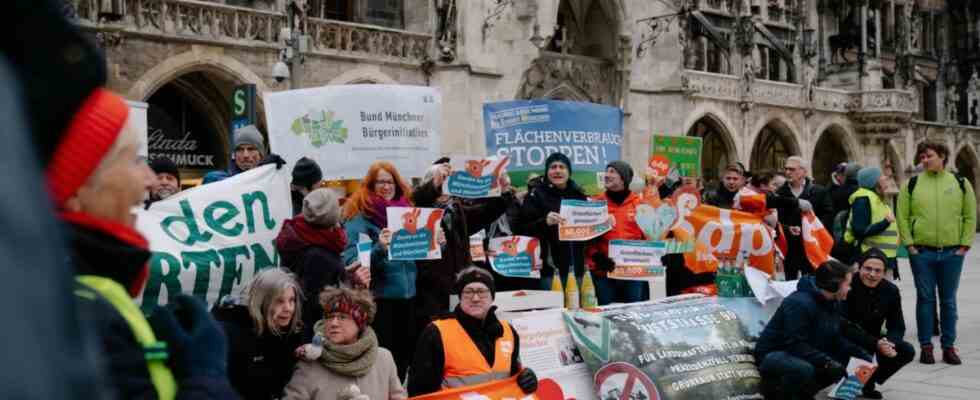“Politics in its purest form”, a day of celebration for convinced democrats, that’s how ÖDP faction leader Tobias Ruff saw it. “Long live political opportunism,” a day of tactical bicycle kicks, that’s how Mayor Dieter Reiter (SPD) experienced it. In any case, Wednesday was the day on which the city council accepted the demands of the citizens’ initiative “Preserve green spaces” in a resolution with a large majority. A referendum is therefore no longer necessary, the will of the approximately 60,000 signatories has been satisfied. City Councilor Dirk Höpner (Munich Liste) took the opportunity to congratulate the three initiators Stefan Hofmeir, Clement Meier and Helmut Köpf.
They had already celebrated their victory with their supporters on Wednesday in front of the town hall, and the majority for their cause had been apparent since Monday evening. But the citizens’ initiative and the debate in the city council also showed how complicated the paths in local politics can be. No faction found and does not find the idea of the citizens’ request to preserve green spaces wrong. This was underpinned by numerous city councilors in their speeches. However, a large majority still finds the way to protect greenery across the board based on the land use plan questionable. Nevertheless, she now wants to hit him.
The ÖDP/Munich List, SPD and FDP factions remained undeterred in their direction. However, on different sides. Although the ÖDP officially joined the citizens’ initiative late, parliamentary group leader Ruff also acted as one of its spokespersons. The insufficient protection of green spaces is one of the open construction sites of city politics, he said. It must and will now become an “absolute taboo” to tackle them. In other words: to seal or build on. Citizens would still have to walk to a green space or park in the future. In addition to this social thrust of the citizens’ initiative, he focused on climate and species protection.
But Ruff couldn’t resist giving the critics of the citizens’ initiative one, who accused him and his fellow campaigners of an ego trip by the always-against-everything citizens, which led to higher rents because housing construction was now being slowed down. “Cardboard comrades were set up and shot” who had nothing to do with the matter. The spokesman for the citizens’ petition found a “very, very bad style” among the opponents, especially in the SPD.
A passionate campaigner for the citizens’ initiative: Tobias Ruff, ÖDP.
(Photo: Florian Peljak)
The Social Democrats, like the FDP, consistently refuse to give their consent. You see the ÖDP at the top of the citizens who would like to stop all residential and commercial construction and close the city due to overcrowding. The citizens’ request is “part of a campaign by a small party”, namely the ÖDP, which also works with “false or half-true platitudes”, said parliamentary group leader Christian Müller. In any case, preserving the green spaces has long been a maxim of the SPD policy, which, however, also needs opportunities to develop the city by exchanging or replacing green spaces.
“Planning and housing requires attitude,” said Müller. He left no doubt that he also lacked one in the Green coalition partner. Müller portrayed Mayor Katrin Habenschaden and parliamentary group spokeswoman Mona Fuchs as not very loyal to their opinions. He quoted with relish how the two of them had spoken out against falling over in front of every citizens’ initiative in general and against the wording of the citizens’ initiative in concrete terms just a few days ago. You have to take the commitment of the citizens seriously, you share the goals anyway, only the way, “that’s where the spirits divide,” said Fuchs.
Complains about the lack of attitude on the part of his green coalition partner: SPD parliamentary group leader Christian Müller.
(Photo: Florian Peljak)
If the SPD hadn’t blocked it and if it had been possible to agree on a wording for a council decision, then the Greens would have voted against accepting the demand from the citizens’ initiative, said Fuchs. Now the group agrees, knowing that according to the legal opinion of the planning department, the city council still has “room for maneuver” and can weigh up how a green space is used in individual cases.
The CSU also voted to take over the citizens’ initiative, although it finds it difficult. “We would not ask the question like that,” said spokesman Manuel Pretzl. The parliamentary group struggled with itself, but ultimately the interpretation of the planning department was decisive. That large construction projects would suffer is “complete nonsense”. They are not created on green spaces, which are now being specially protected. Together with the Greens, the CSU decided in the decision that ongoing proceedings would not be affected retrospectively. Mayor Reiter considers this illegal and will submit this passage to the government of Upper Bavaria as the supervisory authority.
Although he did not agree with their content, Reiter thanked the committed citizens because “they meant it seriously and honestly”. That distinguishes them from the Greens and the CSU, who acted solely out of “political calculations”. This is easy to see through in relation to the citizens’ initiative: “We want to take it over, but nothing can change.” You will now hear many empathetic reasons from the CSU and the Greens in the planning committee as to why the citizens’ initiative does not come into play in this or that individual case, he predicted. “Potemkin in its purest form,” is how he described the attitude of the two largest factions.

